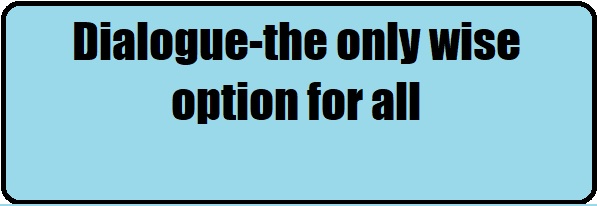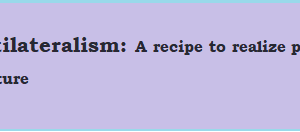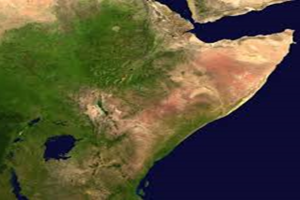
Ethiopia is a land of contrasts in almost every respect. Some are funny, and others are serious. The current Ethiopian Premier is one of the youngest leaders in Africa. However, the head of a provisional commission, who is the chief architect of a key political project in the country and whose actions are eagerly followed by 120 million Ethiopians, is a septuagenarian. There are also serious contrasts among the narratives of Ethiopia’s past, present, and future, which have led to tensions and conflicts that threaten the nation’s peace and huge potential for prosperity.
The two words that Ethiopians currently reiterate most often are peace and stability. However, ensuring peace for the people and stability of the political system is a daunting task that cannot rest on the shoulders of the government alone. It requires the full commitment to peace of the rival political forces, civil society, academics and the general public represented by various social groups.
A favourable climate must therefore be created in which the government can share the collective responsibility for securing peace and stability with the above-mentioned actors. To achieve this, a broad consensus on fundamental national issues among these actors is essential.
The only viable and sustainable option for achieving this common and fundamental understanding is not the imposition of the will of the powerful, but dialogue conducted with an open mind and willingness to compromise, and the acceptance of change in the interest of peace and stability of the nation, regardless of party lines and potential side effects on personal and group interests.
The recent progress made by the Ethiopian National Dialogue Commission (ENDC) in its efforts to organize the first-ever national dialogue in the country’s political history is commendable. This progress has raised optimism among Ethiopians, both at home and abroad, for the return of lasting peace and stability in their nation.
In addition to the impressive progress made by ENDC, there are other reasons for the optimism unfolding in the country’s political landscape. The transitional justice policies have been promulgated and are set to be implemented soon. Furthermore, a new law has provided opportunities for outlawed political parties and those who have resorted to violence to participate in a legitimate and nonviolent political struggle.
The majority of Ethiopians have a strong sense of optimism about Ethiopia’s political and economic future, and this sentiment is also shared by foreign analysts, international institutions, and think tanks. Even those who focus solely on economic forecasts implicitly acknowledge the positive political outlook, as economic progress is often contingent on an improved political situation.
Looking at the process of the national dialogue, in particular, ordinary citizens and scholars alike, share solid confidence in the ENDC in bringing the desired outcome from the process before the commission finishes its legal term which ends in February 2025, in less than eight months.
The strong public confidence in the ENDC appears to stem from at least four points. The first thing is the commission is acting independently without the unsolicited contact /involvement of government authorities and institutions. Secondly, it is being led by commissioners well-seasoned in both education and experience.
The chief commissioner, for instance, is not just a professor of Psychiatry. He has done internationally published extensive research in Social and Political Philosophy, Ethics, and Conflict Resolution. These people are believed to be less likely to bow to authorities’ pressures or be swayed by material benefits to compromise their integrity and public trust.
Third, the national dialogue is planned in meticulously researched policies and procedures that take into account t both the successful and failed national dialogue processes held in various countries. As they say, a durable house is one with a carefully made foundation. The ENDC has taken an extended time for the preliminary stages that took a better part of its three-year term stated in its founding proclamation.
The fourth point is, that the time-tested, unique, and rich indigenous knowledge and practices of negotiation of elders of various tribes and communities are additional inputs that fuel ENDC’s ambition to achieve its ultimate objective. As most Ethiopians are conservative and have a deep attachment to their traditional values, it would not be surprising to see that ENDC attached vital importance to using traditional values.
As stated in its founding proclamation, Proclamation No.1265/2021, one of the guiding principles of the ENDC is using national traditional knowledge and values.
The fifth point is, while maintaining its legal personality as an independent and impartial entity free from the influence of the government and any other power, The ENDC enjoys full cooperation from the government both at federal and regional levels in getting positive responses for its administrative and logistical cooperation support requests for its efforts for a successful national dialogue process.
Speaking of the relationship between the government and ENDC, there is one point that should be worth noting. The English version of the ENDC proclamation -No.1265/2021 appears to be erroneous since it fails to express the unequivocal independence of ENDC from any organ of the government. Article 4/1 of part two of the proclamation reads: “ The Ethiopian National Dialogue Commission, an impartial and independent organ of the Federal Government with its legal personality, has been at this moment established by this proclamation.”. However, the Amharic version clearly states that ENDC is free from the influence of any organ of the government. Even, the word ‘Federal’ is not present in the Amharic version. By default, it is the Amharic version that overrides the English version.
The part of the speech the ENDC Chief made at the opening ceremony of the agenda-gathering phase, which got little media attention was the commission’s plan to forward more important support requests to the government in the near future.-possibly actions that would be considered as a gesture of peace like the release of prisoners suspected of committing various criminal activities undermining the peace and stability of the state. Such actions would undoubtedly encourage the rival political forces that are currently keeping themselves aloof from the table of the national dialogue.
The national dialogue that is about to be held shortly is undoubtedly a historical event in Ethiopian politics that would set a milestone and bring fundamental positive change to the nation’s political system, paving grounds for sustainable peace and stability in the nation. Without setting preconditions, without the ifs and buts, all political entities should seize this historical opportunity to be part of the process that would shape the nation’s future.
In a recent speech he made recently one of the commissioners of ENDC, Ambassador Mohammed Drir described the national dialogue as pivotal for the nation saying “ It is time to have a genuine dialogue that would not leave any social group, political group, armed group, and other actors outside.”
As the work of ENDC progresses and approaches its climax, the consultation phase on the selected agenda, and as the governments keep on taking more reconciliatory measures in the interest of peace, it is expected that more and more political parties will join the bandwagon of the national dialogue that rolls on the road heading toward sustainable peace and prosperity.
Many analysts agree that political actors sooner or later would realize that none of them would achieve their political objectives by resorting to violence. They will soon realize that dialogue is the only wise option and engaging in violence would only bring the suffering and loss of life and livelihood of the people they say, they are fighting for.
Overall, if the current national dialogue process continues at its current pace, maintains the support of all stakeholders, and takes all necessary steps to ensure inclusivity, it will certainly achieve its ultimate goal of establishing national consensus and the reinforcement of the foundation of the Ethiopian state. Thus it would transform the current challenging and bleak political atmosphere into a positive one.
BY SOLOMON WASSIHUN
THE ETHIOPIAN HERALD SATURDAY 22 JUNE 2024





